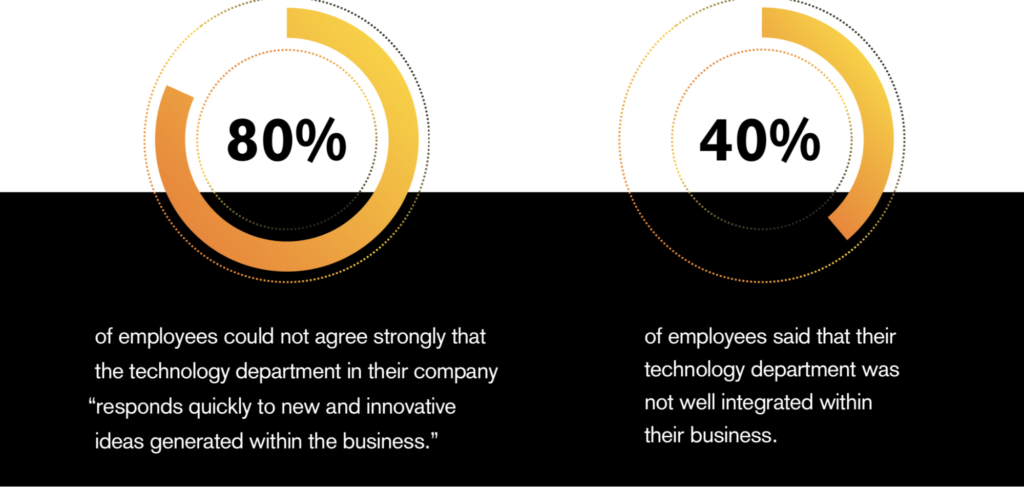
Everyday there are many companies that undertake the path of digital transformation in one way or another to achieve their goals. But this journey in a time of rapid change means a new approach to one’s strategy that has an agile and adaptive culture at its very core. Effective digital transformations are those that have leaders who understand how to take their visions to reality and take the whole team with them.
In the face of rapid and unpredictable technological change most companies undertake large and expensive digital projects. In 2018 approximately 1.3$ trillion was invested in digital transformation initiatives but most of this spending fell short of its objectives. Infact a staggering 70% failed to integrate digital as a cohesive part of strategy.
You may ask Why?
Answer-It’s Organisational Culture that presents the biggest barrier to change. Technology by itself is not the problem when most people need to be persuaded to adopt new digital tools.
Three key problems that hinder growth and stop a company’s success in the digital age are-
1- departmental disharmony
2- the fear to take risks or make changes
3- differing on views of the customer.
All three in a nutshell means cultural and behavioural challenges.
Any kind of change management initiative means engaging with one’s people from within, they- your team need to be inspired and they need to be taken on a journey from where they are at present to where the future is on the company’s roadmap.
But what is Culture exactly and how can it be adapted to meet the new changes and challenges?
To begin with, it’s important to understand that having a ‘Culture of Innovation’ is not an option but actually Vital to the lifeline of any brand/organisation.
Every organisation has its unique culture and its own way of expressing and there can never be a one-size fits all solution but actively measuring culture is something everyone can implement within their organisation and act on it.
A culture of sharing, where people feel safe to express and be who they are, makes it achievable to transition change even though it’s not easier.
Most tend to regard Culture as being linked to inclusivity and centred around HR processes but it actually goes beyond this.
Culture simply can mean ‘the way people do things around here’ but it can be expanded into 3 key elements
Values- these are the grounding principles that a company bases its foundations on
Behaviour– The way these values are expressed on a day to day basis within the organisation.
Process- it’s how these behaviours then become a standard to be integrated all throughout the organisation.
It’s only when these three elements come to working well together can an organisational culture reach a sense of balance and harmony from within and thus the transformational journey begins.
Recent studies have found that an emphatic focus on Culture makes companies more agile, flexible and have a strong business growth with a clear mission and purpose. The communication of any company’s mission and vision must come from the leadership where the leaders themselves are proactive and genuinely care.
Too often, culture is misunderstood and miscommunicated
According to a research undertaken by Temporall- (UK based forward thinking company) more than a third of employees found that their company did not have a strong mission and purpose that was clearly communicated by their leadership. Less than a quarter strongly agreed that their leadership was even aware of the impact of its behaviour on the company. And a majority lacked a clear understanding of “company culture,” thinking it was linked primarily to inclusivity.

The above figure reflects a classic disconnect in an organisation where digital technology has either not been embraced fully or there has been a lack of support for employees to make this transition.
Digital transformation projects fail because
1- The quality of leadership is not geared up
2- The role of HR in hiring people that match a company’s long term vision
3- The change in people’s natural cadence as the transformation journey begins
4- The starting point from where an organisation begins its journey, as many organisations lack a basic culture of speed, agility and innovation
5- The lack of process to embed and support change, new behaviours, people’s ability to transform, digital teams to engage cohesively inside a company
6- Lack of intuitive understanding as to what exactly constitutes a culture
7- Lack of a holistic foundation where people have the opportunity and the space to evolve as professionals and human beings

So let’s try and nail this in brief.
To me- a great company culture goes beyond high performance of its team, it’s more about a general air of understanding where everyone feels safe to be who they are and express themselves and at the same time taking the company vision forward. Clarity of leadership and the simplicity in communication is what makes a company’ culture agile and adaptable to rapid changes.
To create a secure environment, organizations need to measure, monitor and adapt behaviour on a continuous basis, so they can identify strengths and weaknesses, and intervene where necessary. A relaxed relationship between strategy and innovation that becomes ongoing and adaptive can also be integrated along with the existing ‘fixed term approach’ to planning. No one knows where they will be in 5 years etc but everyone knows and understands the direction in which they are headed. So this can become a road map of measuring culture when the digital transformation journey begins.
But all of this can come about only if the leadership, the company and the people each understand their ‘Purpose’- their raison d’etre and Purpose is found not in some lofty 10 year vision but more so in the regular day to day workings of the company.
Successful digital transformation means realigning technology, people, organization and leadership, all at the same time and regularly. Three of these—employees, organization and leadership—fit within the wide definition of culture. It’s about ‘oneness’ and for people to experience this internally and externally on a consistent basis. People need to know that the company/the leadership has got their back and vice versa. Also everyone must proactively work to co-create an ambience devoid of jealousy, competition, comparison, and one upmanship or individuality.
Thus a true company culture can look like this- Harmonious, adaptive. Non judgemental, secure and always Evolving.
It’s important to measure culture consistently and make that a foundation even before any organisation starts to undergo digital transformation as this will then effectively allow for that process to be seamless. It’s not just about where a company or its people are going, it’s about understanding where they are in the present moment and what to do to reach their destination.
It’s about understanding the true purpose of it all where compassion, trust and shared core values become the cornerstone of digital growth and transformation.
Our ethos @Elixir is that we love to give back to the world by working with our clients and fostering long term relationships.
Our brand founder and author of this blog Chetan Jha is leading not just change but also innovation across the board through best practises that echo compassion understanding and reflection. To know more, email us: [email protected]
